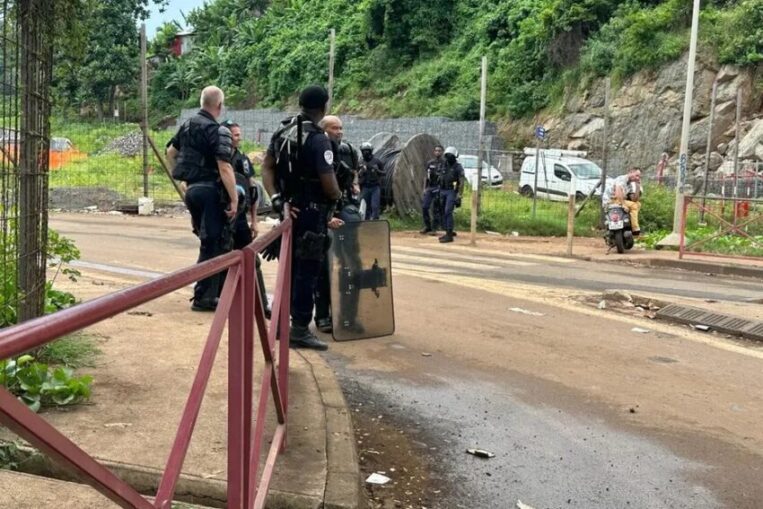
Youth on the island of Mayotte – located between Madagascar and Mozambique – defended themselves against the colonial occupation forces of the French police on 25 April. This comes after France sent 1,800 officers to the Indian Ocean island, which it has colonized since 1841, to evict migrants and demolish their temporary housing. However, migrants gained a temporary reprieve after a French court ruled the evictions unlawful.
Mayotte youth defend themselves against police
Youth resisted the French police forces outside Mamoudzou, Mayotte’s capital, on 25 April. Barricades of tyres and dustbins lined the road, and protesters threw stones at police. Police attacked protesters with tear gas.
Youth in the district of Tsoundzou, outside Mamoudzou, had also fought deployed French police since 23 April.
France is carrying out the evictions under the banner of Operation Wuambushu, a word that translates as ‘Take Back’. It aims to expel migrants from Mayotte, allegedly to improve living conditions for locals in the poorest department occupied by France. To do so, it wants to remove all people without papers to the island of Anjouan, 43 miles away.
Local campaigners described the French state’s operation as a “massacre waiting to happen”.
Fortress Europe
Anjouan is part of Comoros, a nation of four islands that was first subject to French imperialism in 1841. It voted for independence from France in 1974. However, Mayotte remains colonized by France today. Then in March 2011, Mayotte became the 101st French department, or administrative area, in accordance with another referendum two years earlier.
Despite being classified as a territory of the EU, Mayotte doesn’t enjoy France’s economic privileges, with approximately 77% of people on the island living below the poverty line.
Around half of Mayotte’s roughly 350,000 population is estimated to be from other islands, many of them from Comoros. Many migrants, especially Comorans, try to reach Mayotte every year via small boats. This is because, despite its economic situation, many Comorans believe Mayotte offers better opportunities than Comoros.
Their crossings risk ending in tragedy when the ‘kwassa kwassa’ (small motorised fishing boats) are shipwrecked. An estimated 7000 to 10,000 people died attempting to reach Mayotte between 1995 and 2012, while France currently deports 24,000 people a year from the island.
‘Overjoyed’
Although French police started evicting people on the morning of 25 April, one community gained a temporary reprieve. A court in Mamoudzou stopped a clearance in Koungou, near the capital, at the last minute. It said the action had no legal foundation and threatened public liberties.
Mdohoma Hadja, a resident, said:
I am overjoyed, we went to court and we won.
Meanwhile, Comoros itself refused to allow entry to a boat carrying migrants from the island. It also said it had suspended passenger traffic at a port where deported migrants usually land.
Comoros’ leader Azali Assoumani previously said he hoped France would abandon the operation. He admitted the nation didn’t have “the means to stop the operation through force”. Assoumani has held the rotating presidency of the African Union since February.
An extension of European colonialism
French radical media outlet Contre-Attaque said France is using Mayotte to experiment with its anti-immigration policies. It described Operation Wuambushu as a ‘publicity stunt’ to show the severity of the French state in its crackdown on ‘undesirables’, particularly those it considers illegal migrants. This mirror’s Benoît’s description of the EU’s outermost regions as a place of experimentation, with border regimes that are later imported back into mainland France.
The Comoros archipelago lies thousands of miles from mainland Europe. Nonetheless, people there face the same draconian border regime as those attempting to reach countries on the continent. It’s a reminder of how deeply embedded European colonialism’s footprint is on the contemporary world, and how its border policing is a massacre by another name.
Source (with some edits): the Canary